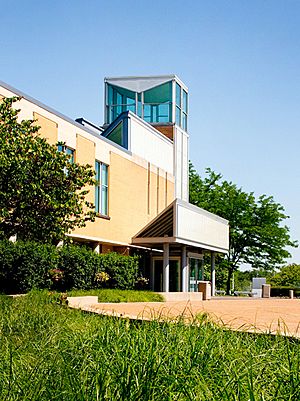Academic administration facts for kids
Academic administration is like the team of grown-ups who help run a university or college. They make sure everything works smoothly, from the buildings to the computers. Think of them as the people behind the scenes who keep the school organized and safe.
While teachers (called faculty or academics) focus on teaching and research, administrators handle the daily operations. Many top administrators used to be teachers or researchers themselves. They often have advanced degrees, but now their main job is to manage the school.
Contents
What Do Academic Administrators Do?
Academic administrators have many important jobs to keep a school running well. Here are some of their main tasks:
Helping Students and Teachers
- Admissions: They help decide who gets to join the school. This includes reviewing applications and making sure new students are welcomed.
- Student Services: They offer support for students, like career advice, help with disabilities, and managing the school's library.
- Academic Support: They work with teachers and professors. This includes helping with hiring new staff and making sure everyone has what they need to teach.
- Keeping Records: A special office, often led by a registrar, keeps track of all student grades and official documents.
Managing the School's Resources
- Money Matters: Administrators manage the school's budget. They make sure money is spent wisely and keep track of all financial records.
- Buildings and Grounds: They are in charge of maintaining and building new classrooms, dorms, and other school buildings. They also make sure the campus looks nice and is well-kept.
- Safety and Security: They ensure the campus is a safe place for everyone. This often involves a team like campus police or public safety officers.
- Technology: They manage all the computers and internet networks. This helps students and teachers connect and learn.
- Fundraising: Some administrators work to raise money for the school. They get donations from people and organizations to help pay for new programs or buildings.
- Public Relations: They talk to the media, the local community, and the government. This helps share what the school is doing and build good relationships.
Who Are the Leaders?
Different schools use different names for their top leaders. Here are some common titles you might hear:
Top Leaders of Universities
The main boss of a university might be called a:
- University President
- Provost
- Chancellor (especially in the United States)
- Vice-Chancellor (common in many Commonwealth countries)
- Principal (used in Scotland and Canada)
- Rector (often found in Europe, Russia, and parts of Asia and South America)
These leaders are in charge of everything that happens at the university.
Leaders of Departments and Schools
- A Dean is usually a leader in charge of a specific part of the university. For example, there might be a Dean of Students or a Dean of the College of Arts.
- For schools that are not universities, like high schools or middle schools, the main leader might be called a headmaster, head teacher, or principal. Sometimes, a director leads a specific program or smaller institution.
See Also
 | Georgia Louise Harris Brown |
 | Julian Abele |
 | Norma Merrick Sklarek |
 | William Sidney Pittman |


